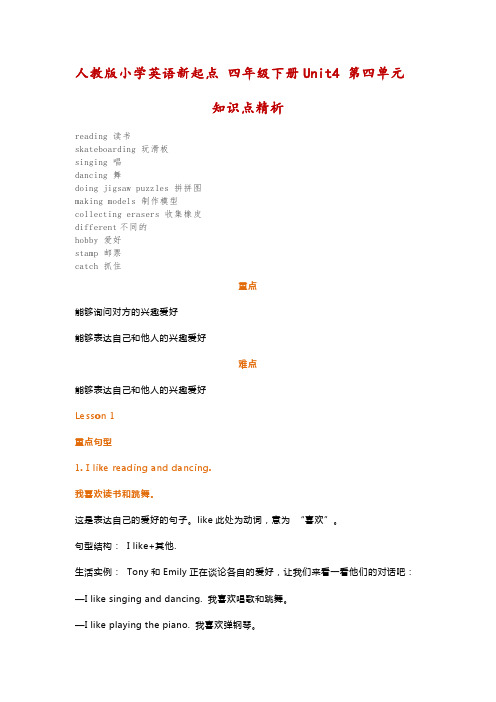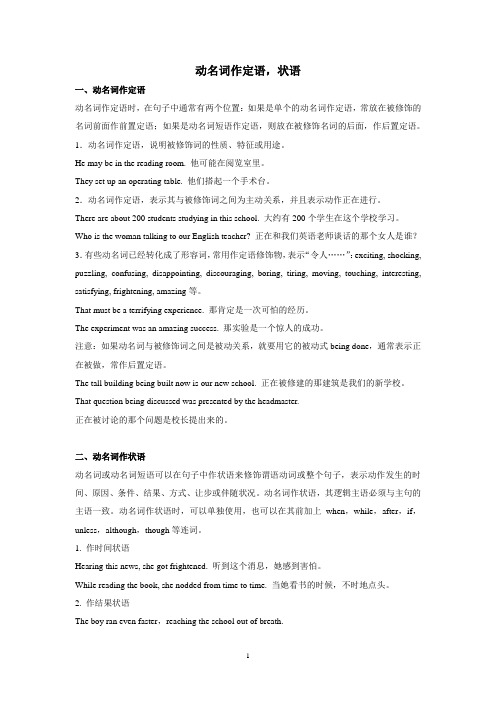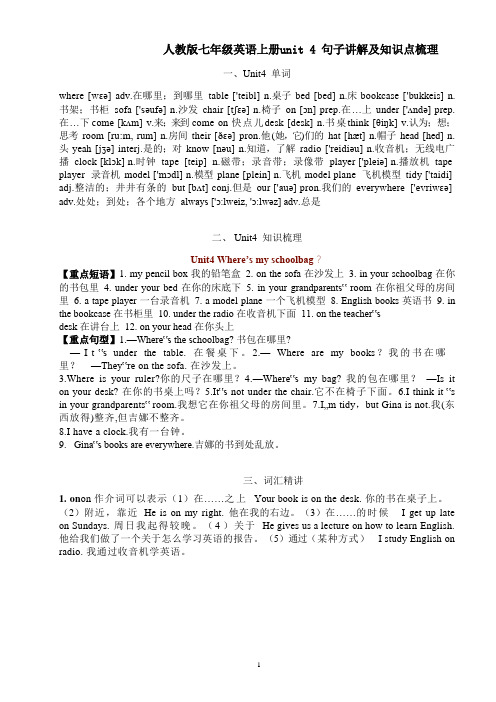Book 4 Unit 4 重点短语和句子
四年级上册英语单词和句子表

四年级上册英语单词和句子表一、Unit 1 My classroom。
1. 单词。
- classroom [ˈklɑːsruːm] (n.) 教室。
- window [ˈwɪndəʊ] (n.) 窗户。
- blackboard [ˈblækbɔːd] (n.) 黑板。
- light [laɪt] (n.) 电灯;(adj.) 轻的。
- picture [ˈpɪktʃə(r)] (n.) 图画。
- door [dɔː(r)] (n.) 门。
- teacher's desk [ˈtiːtʃəz desk] 讲台。
- computer [kəmˈpjuːtə(r)] (n.) 计算机。
- fan [fæn] (n.) 风扇。
- wall [wɔːl] (n.) 墙壁。
- floor [flɔː(r)] (n.) 地板。
2. 句子。
- We have a new classroom. [wiː hæv ə njuːˈklɑːsruːm] 我们有一个新教室。
- Let's go and see! [lets gəʊænd siː] 让我们去看看!- Where is it? [weə(r) ɪz ɪt] 它在哪里?- It's near the window. [ɪts nɪə(r) ðəˈwɪndəʊ] 它在窗户旁边。
- Let me clean the windows. [let miː kliːn ðəˈwɪndəʊz] 让我擦窗户。
二、Unit 2 My schoolbag。
1. 单词。
- schoolbag [ˈskuːlbæɡ] (n.) 书包。
- maths book [mæθs bʊk] 数学书。
- English book [ˈɪŋɡlɪʃ bʊk] 英语书。
- Chinese book [ˌtʃaɪˈniːz bʊk] 语文书。
人教版小学英语新起点 四年级下册Unit4 第四单元知识点精析

人教版小学英语新起点四年级下册Unit4 第四单元知识点精析reading 读书skateboarding 玩滑板singing 唱dancing 舞doing jigsaw puzzles 拼拼图making models 制作模型collecting erasers 收集橡皮different不同的hobby 爱好stamp 邮票catch 抓住重点能够询问对方的兴趣爱好能够表达自己和他人的兴趣爱好难点能够表达自己和他人的兴趣爱好Lesson 1重点句型1. I like reading and dancing.我喜欢读书和跳舞。
这是表达自己的爱好的句子。
like此处为动词,意为“喜欢”。
句型结构:I like+其他.生活实例:Tony和Emily正在谈论各自的爱好,让我们来看一看他们的对话吧:—I like singing and dancing. 我喜欢唱歌和跳舞。
—I like playing the piano. 我喜欢弹钢琴。
2. like的用法(1)like作动词,意为“喜欢”,有对某人某事或某物赞许或产生兴趣的含义。
① like sb./ sth.意为“喜欢某人/某物”。
例:I like apples.我喜欢苹果。
②like与动名词连用,即like doing sth.,在意义上相当于enjoy doing sth.,意为“喜欢做某事”,表示经常性的习惯或爱好。
例:I like singing very much.我非常喜欢唱歌I don't like drawing. 我不喜欢画画。
③like与动词不定式连用,即like to do sth.,意为“喜欢做某事”,表示具体的一次行为。
He likes to playfootball at weekends. 他喜欢在周末踢足球。
(2)like 作介词,意为“像”。
例:He looks like hisfather.他看起来像他的爸爸。
Book_4_Unit_4_Grammar_动名词作定语_状语

动名词作定语,状语一、动名词作定语动名词作定语时,在句子中通常有两个位置:如果是单个的动名词作定语,常放在被修饰的名词前面作前置定语;如果是动名词短语作定语,则放在被修饰名词的后面,作后置定语。
1.动名词作定语,说明被修饰词的性质、特征或用途。
He may be in the reading room. 他可能在阅览室里。
They set up an operating table. 他们搭起一个手术台。
2.动名词作定语,表示其与被修饰词之间为主动关系,并且表示动作正在进行。
There are about 200 students studying in this school. 大约有200个学生在这个学校学习。
Who is the woman talking to our English teacher? 正在和我们英语老师谈话的那个女人是谁?3.有些动名词已经转化成了形容词,常用作定语修饰物,表示“令人……”:exciting, shocking, puzzling, confusing, disappointing, discouraging, boring, tiring, moving, touching, interesting, satisfying, frightening, amazing等。
That must be a terrifying experience. 那肯定是一次可怕的经历。
The experiment was an amazing success. 那实验是一个惊人的成功。
注意:如果动名词与被修饰词之间是被动关系,就要用它的被动式being done,通常表示正在被做,常作后置定语。
The tall building being built now is our new school. 正在被修建的那建筑是我们的新学校。
That question being discussed was presented by the headmaster.正在被讨论的那个问题是校长提出来的。
人教版book4u4知识点(学生版)必修四 Unit 1 Women of achievement

B4U1 Women of achievement Language points核心单词1. achievement n.[C]成就;功绩;\[U\]实现;完成;达到联想拓展achieve v.取得,实现achieve an aim/a goal达到目标achieve success 获得成功He received the Nobel Prize for his scientific achievements. 他因科学上取得的成就而获得诺贝尔奖。
Flying across the Atlantic for the first time was a great achievement. 首次飞越大西洋是一个伟大的功绩。
高手过招完成句子①没有人民的支持,我们将一事无成。
Without the support of the people we can .②我只完成了我所希望完成的工作的一半。
I have achieved only half of I hope to do.③祝贺你获得这样完美的胜利。
Congratulations to you (介词) such a complete victory.2. behave vi.举止,行为,表现;(机器等)工作,运转(常与well/badly等副词连用)vt.守规矩;举止有礼常用结构:behave oneself 使某人自己举止规矩Behave yourself; don’t make a fool of yourself. 注意你的举止, 别闹出笑话来。
How is your new car behaving? 你的新车性能如何?联想拓展behaviour n. (人的)言行举止,行为;(动物)习性,自学成才behaviour towards/to... 对……的态度/行为高手过招(1)单项填空①David is quite well in school. He obeys the teachers and gets As in all his subjects. (2009山东潍坊检测)A. behavedB. concernedC. involvedD. respected(2)完成句子①父母让孩子们在客人面前举止礼貌。
人教版七年级英语上册unit 4 句子讲解及知识点梳理

人教版七年级英语上册unit 4 句子讲解及知识点梳理一、Unit4 单词where [wɛə] adv.在哪里;到哪里table ['teibl] n.桌子bed [bed] n.床bookcase ['bukkeis] n. 书架;书柜sofa ['səufə] n.沙发chair [tʃɛə] n.椅子on [ɔn] prep.在…上under ['ʌndə] prep. 在…下come [kʌm] v.来;来到come on 快点儿desk [desk] n.书桌think [θiŋk] v.认为;想;思考room [ru:m, rum] n.房间their [ðɛə] pron.他(她,它)们的hat [hæt] n.帽子head [hed] n. 头yeah [jʒə] interj.是的;对know [nəu] n.知道,了解radio ['reidiəu] n.收音机;无线电广播clock [klɔk] n.时钟tape [teip] n.磁带;录音带;录像带player ['pleiə] n.播放机tape player 录音机model ['mɔdl] n.模型plane [plein] n.飞机model plane 飞机模型tidy ['taidi] adj.整洁的;井井有条的but [bʌt] conj.但是our ['auə] pron.我们的everywhere ['evriwɛə] adv.处处;到处;各个地方always ['ɔ:lweiz, 'ɔ:lwəz] adv.总是二、 Unit4 知识梳理Unit4 Where’s my schoolbag?【重点短语】1. my pencil box 我的铅笔盒 2. on the sofa 在沙发上 3. in your schoolbag 在你的书包里4. under your bed 在你的床底下 5. in your grandparents‟ room 在你祖父母的房间里 6. a tape player 一台录音机7. a model plane 一个飞机模型8. English books 英语书9. in the bookcase 在书柜里10. under the radio 在收音机下面11. on the teacher‟sdesk 在讲台上12. on your head 在你头上【重点句型】1.—Where‟s the schoolbag? 书包在哪里?—I t ‟s under the table. 在餐桌下。
人教版高中英语必修 4 unit 4语法精讲精练--- 分词作定语和状语

必修 4 unit 4语法精讲-----分词作定语和状语一、作定语。
单个的分词作定语时放在所修饰词的前面,但是如果修饰some/any/no/every+thing/body/one 或者指示代词those时,分词应在其后。
分词短语作定语时应放在所修饰词的后面。
在用作定语时,分词在意思上接近一个定语从句。
The boring snow made the bored boys go home. (= The snow was boring, so the boys wee bored and went home.)注:现在分词与过去分词都可作定语,但现在分词表达的是正在进行的事情,有主动意义;而过去分词表示的是已完成的事情,有被动意义。
例如:I have no teeth left.Anyone swimming will be punished.The question being discussed in the meeting is very important.There are a lot of fallen leaves on the ground.二、作状语。
分词在句中作状语时表示动作发生的时间、原因、条件、结果或让步等,多置于句首,做伴随状语,多放在后面。
分词用于go doing结构中作目的状语。
分词短语作状语时,其逻辑主语必须与句子的主语一致。
如果与句子主语不一致,那么分词短语就需要有自己的逻辑主语,且要用独立主格结构形式来表达。
①时间状语:分词作时间状语相当于时间状语从句。
现在分词作时间状语一般位于句首,表示的动作和谓语动词的动作同时发生,有时现在分词前可以加上时间连词。
如果分词动作发生在谓语动词之前,用现在分词的完成体形式。
过去分词作时间状语与谓语动词构成同时性和被动意义。
分词前有时加上时间连词。
Arriving (=When he arrived) at the bus stop, he found his sister there.Waiting (=When I was waiting) to see the doctor, I met with a friend of mine.Having (=When we have) made full preparations, we are ready for an examination.Having (=When he had) finished his homework, he went to bed.After finishing his homework, he went to bed.Seen (=When the town is seen) from the hill, the town looks more beautiful.Locked (=When he was looked) up in the room, he found himself isolated from the outer world.When asked to make a speech, he said he was glad to do so.当请他作演讲时Once recovered, he will go all out to do his work.一旦康复②原因状语:分词作原因状语相当于原因状语从句。
人教版八年级下册英语复习 Unit 4 重要短语、句型、重点讲解及作文范文

人教版八年级下册英语 Unit 4重要短语、句型、重点讲解及作文范文Unit 4 Why don’t you talk to your parents?一、重点短语1. have free time有空闲时间2. allow sb. to do sth. 允许某人做某事3. hang out with sb. 与某人闲逛4. after-school classes课外活动课5. get into a fight with sb. 与某人吵架/打架6. until midnight直到半夜7. talk to sb. 与某人交谈8. too many太多9. study too much学得过多10. get enough sleep有足够的睡眠11. write sb. a letter给某人写信12. call sb. up打电话给某人13. surprise sb. 令某人惊讶14. look through翻看15. be angry with sb. 生某人的气16. a big deal重要的事17. work out成功地发展;解决18. get on with不11睦相处;关系良:19. fight a lot经常吵架/打架20. hang over笼罩21. refuse to do sth. 拒绝做某事22. offer to do sth. 主动提出做某事23. so that以便24. mind sb. doing sth. 介意某人做某事25. all the time一直26. in future今后27. make sb. angry使某人生气28. worry about sth. 担心某事29. copy one’s homework抄袭某人的作业30. be oneself做自己31. family members32. spend time alone独自消磨时光33. give sb. pressure给某人施压34. have a fight with sb. 与某人吵架35. compete with sb. 与某人竞争36. free time activities业余活动37. get better grades取得更好的成绩38. give one’s opinion提出某人的观点39. learn exam skills学习应试技巧40. practice sports体育训练41. cause stress造成压力42. cut out删除第1页共12页二、重点句型1. I studied until mid night last night so I didn’t get enough sleep.我昨晚学习到半夜所以睡眠不足。
人教版七年级英语上册Unit4 单词 知识梳理 词汇句式精讲

人教版七年级英语上册Unit4单词知识梳理词汇句式精讲Unit4 单词where [wɛə] adv.在哪里;到哪里table ['teibl] n.桌子bed [bed] n.床bookcase ['bukkeis] n.书架;书柜sofa ['səufə] n.沙发chair [tʃɛə] n.椅子on [ɔn] prep.在…上under ['ʌndə] prep.在…下come [kʌm] v.来;来到come on 快点儿desk [desk] n.书桌think [θiŋk] v.认为;想;思考room [ru:m, rum] n.房间their [ðɛə] pron.他(她,它)们的hat [hæt] n.帽子head [hed] n.头yeah [jʒə] interj.是的;对know [nəu] n.知道,了解radio ['reidiəu] n.收音机;无线电广播clock [klɔk] n.时钟tape [teip] n.磁带;录音带;录像带player ['pleiə] n.播放机tape player 录音机model ['mɔdl] n.模型plane [plein] n.飞机model plane 飞机模型tidy ['taidi] adj.整洁的;井井有条的but [bʌt] conj.但是our ['auə] pron.我们的everywhere ['evriwɛə] adv.处处;到处;各个地方always ['ɔ:lweiz, 'ɔ:lwəz] adv.总是02Unit4 知识梳理Unit4 Where’s my schoolbag?【重点短语】1. my pencil box 我的铅笔盒2. on the sofa 在沙发上3. in your schoolbag 在你的书包里4. under your bed 在你的床底下5. in your grandparents’room 在你祖父母的房间里6. a tape player 一台录音机7. a model plane 一个飞机模型8. English books 英语书9. in the bookcase 在书柜里10. under the radio 在收音机下面11. on the teacher’s desk 在讲台上12. on your head 在你头上【重点句型】1.—Where’s the schoolbag? 书包在哪里?—I t ’s under the table. 在餐桌下。
- 1、下载文档前请自行甄别文档内容的完整性,平台不提供额外的编辑、内容补充、找答案等附加服务。
- 2、"仅部分预览"的文档,不可在线预览部分如存在完整性等问题,可反馈申请退款(可完整预览的文档不适用该条件!)。
- 3、如文档侵犯您的权益,请联系客服反馈,我们会尽快为您处理(人工客服工作时间:9:00-18:30)。
Book 4 Unit 4 重点短语和句子1.state his problem 把问题叙述清楚 a solid/ liquid/gaseous state 固态、液态、气态be in a state of poor /good health= be in a poor/good /fit state 健康状况不佳、良好make a (public ) statement to发表公开声明issue a statement发表声明get a bank statement 受到银行的一份结算单a state visit/ railways 国事访问/ 国营铁路women’s social status=women’s status in society 女人的社会地位1) It’s stated that (据说) the fire started in a cottage.2)Under no circumastances (在任何情况下都不)should we give up our dreams.3) The government has taken proper measures to improve the housingconditions(改善住房条件)of families with low incomes.2.greet a friend with a smile 笑迎朋友greet guests at the airport/ New Year 在机场迎接客人/ 迎新年greet sth with sth. 某事做出某种反应(常用于被动语态be greeted with bursts of laughter报以阵阵欢声)a greeting card贺卡 a New Year greeting 新年的祝贺Christmas greetings 圣诞祝词1). The news was greeted with cheering ,booing.(对这消息欢呼喝彩,嘘声四起)2).When he finished his speech,he was affected to see his speech was greeted with cheers andapplauses (观众对。
报以欢呼声和掌声)。
3.choose a committee to represent us 选一个委员会来代表我们represent herself as/ to be a victim/an expert自称是受害者、专家represent the president as a devil把总统描绘成恶魔represent sth to sb.向某人陈述某事be representive of sb./sth有代表性的、是。
的典型特点1).She represented herself as /to be a victim (自称是受害者)of the hotel and complainedabout the bad service2).Living in the suburbs but working in the city is repesentive of (是。
的典型特点)modern people.4.be /feel curious about everything 对一切都感到好奇out of curiousity处于好奇心be curious to know很想知道,渴望知道。
It’s curious that……..。
真奇怪1)The reporter is curious to know(很想知道)whether the official is involved in the case2)It’s curious that (真奇怪)she left without saying goodbye。
5.associate sth with sth把…与….联系在一起be associated with sb /sth 与某人、某事有联系、有关associate with sb 与某人打交道、与某人交往in associattion with sb /sth 与。
联合、联系/ 与某人为伍an associate judge/ professor陪审法官/ 副教授one’s business associate 业务合伙人1).A healthy life is frequently thought to be in close association with /to be associatedwith同。
密切相关)the open countryside and homegrown food.2).Ther has always been close association(一向有密切联系) between the two schools.3).I benefited much from my association with her (与她的交往)。
4). I’m very selective about the people I associate (我与之交往的)。
5) It’s wise for the girl to associate happiness with money. (把幸福与金钱联系在一起)6. Summmer is approaching (即将来临)approach sb for information向某人了解情况approach sb with a suggestion向某人建议approach the manger about taking a day off 同经理谈请一天假的事approach to sth/ doing sth 做。
的方法、途径adopt effective approaches采用有效的方法all the approaches to the palace通向宫殿的所有道路be easy of approach 容易到达,容易接近on the approach of death 临死的时候be good at making approaches to strangers 擅长与陌生人交往1). The best approach to learning English(学习英语的最佳途径)is to expose yourselfto an English environment.2). Having found the approach to solving the problem(找到了解决问题的方法后),wewere so excited and cheered up.3).We heard the approach of the train.(火车开过来了)。
4.)He approached the problem(处理这一问题)as a scientist.7. one of the major aims 其中一个主要目的 a mathemitica major 主修数学的学生major traffic problem 严重交通问题major in economics 主修经济学8 defend her against the accusation 为她辩护,驳斥对她的职指责defend their children from attack from the tiger 保护他们的孩子免受老虎的袭击defend our country against enemies 抵御敌人来保卫我们的国家leave us defenseless against any disease 对任何疾病都无抵抗能力adopt/take defensive measures 采取防御措施fight in defence of our country 为保卫国家而战a defenseless child 没有自我保护能力的孩子9. one of our major tasks/aims 我们的主要任务、目的之一a mathemtics major 主修数学的学生major in economics 主修经济学10. misunderstand your meaning 误解你的意思clear up a misunderstanding 澄清误会avoid misunderstanding 避免误会Ther must be something misunderstandng(一定有什么事误会了). I do n’t know what you are talking about.11. dash a vase to bits/ piecesI’m afraid Imust dash (off)Dashing into the dinning12. spoken English an English –speaking country13. the most likely result/ cause 最有可能的结果、原因Not likely不见得,不大可能Sb./sth be (most/ quite / very .less) likely to dosth.某人,某事(最、很、没有)有可能…..It’s likely that ……有可能……. It is possible/probable to do 做某事是可能的If possible 如果可能的话as soon as possible尽快make it possible to do sth 使做某事成为可能1)With the housing prices rising, I’m not likely to afford (我不可能买得起)even a small deparement.2)It is quite likely that(很有可能)we will misunderstand foreign people without learning about their cultures.14. in general= generally speaking一般来说frankly speaking坦白的说on the whole总的来说It’s generally believed that…人们普遍认为general idea of the passage 文章的大意general hospital 综合医院gneral knowledge/common sense 常识,一般知识a matter of general concern /interest普遍关心、感兴趣的事情1) It is generally /universally accepted that(人们普遍认为)smoking is harmful toour health.2)We kept the conversation/discussion fairly ngeneral (保持谈话、讨论的内容相当广泛)。
